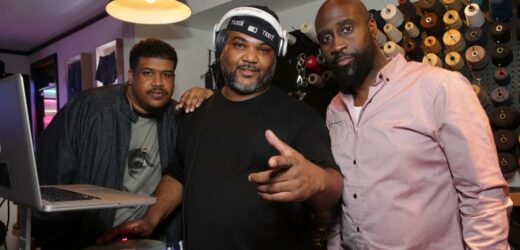After decades of waiting — and a comedic, snafu-filled attempt to get all three members on Instagram Live — De La Soul announced on Tuesday that their catalog, most of which has never been legally available on streaming services, will finally arrive on all major platforms later this year. The announcement follows news earlier this year that the catalog of the group’s original label, Tommy Boy Records, was acquired by Reservoir Music.
“We’re thrilled” said the group’s Dave “Trugoy the Dove” Jolicoeur. “We have come to a deal between ourselves and Reservoir to release our music in 2021 — our catalog will be released this year, we are working diligently with the good folks at Reservoir, and we sat down with them and got it done pretty quickly actually. Our music will be released in 2021 on all streaming platforms — we’re trying to get the whole catalog out there. It’ll take a minute… a little minute… November.”
For many fans, Jolicoeur’s attempts to get his two fellow De La’s onto Instagram Live was more memorable than the announcement. Kevin “Posdnuos” Mercer was at London’s O2 Arena — waiting to go onstage with Gorillaz, who have collaborated with De La in the past — and Vincent “Maseo” Mason was in Florida, but Jolicoeur was comically unable to patch the latter member into the call. The group had posted on social media Monday that they would be making an undisclosed announcement at 3 p.m. ET on Tuesday, but it was after 3:30 when they finally got to the news and almost 3:50 before Mason finally materialized on the session.
Fans had a field day on Twitter and in the comments. “Dave, ask your kids for help please,” one wrote. “This should be your next video,” another chimed in.
About the deal, Mason said, “Just be clear, business was done fair… and with regard to how unique this situation was.”
While the group’s relationship with Tommy Boy became very contentious as it navigated the then-new process of clearing samples — its debut album, “3 Feet High and Rising,” was one of the first to be the target of such lawsuits — the members stressed that there was no bad blood.
“We’re not bashing Tommy Boy or [its founder] Tom Silverman in any way but we are happy that chapter is over and done with and we are happily looking forward to our new relationship with Reservoir.”
With 1989’s “Three Feet High and Rising,” the Long Island trio created one of the truly groundbreaking albums in hip-hop history, bringing a happy, psychedelic, flower-bedecked vibe — dubbed “the D.A.I.S.Y. Age” — to a genre that had largely been musically and lyrically aggressive and/or self-aggrandizing up to that point. With songs like “Me Myself and I,” “Say No Go,” “The Magic Number” and the earlier single “Plug Tunin’,” the album was certified platinum, reached No. 1 on the Billboard R&B/Hip-Hop chart (and No. 24 on the Billboard 200 albums chart) and is universally recognized as one of the best and most influential albums in hip-hop history.
But the album and the group’s other early recordings for decades were mired in legal issues with Tommy Boy, stemming both from the extensive use of uncleared samples — a field that was an unexplored Wild West at the time — and the group’s contract with the company, which the members signed when they were teenagers. Consequently, De La Soul’s classic early recordings are not available on streaming services; the group’s members claimed in 2019 that per their contract, they would receive just 10% of streaming revenue and declined to sign off. Along with much of late R&B singer Aaliyah’s catalog — a standoff that is also, apparently, nearing resolution — it remains one of the few remaining major-artist holdouts from streaming services.
De La Soul spoke on the issue on SiriusXM’s “Sway in the Morning” in February of 2019. Mason explained, “For some years, the catalog had been held up because … of the issues that existed behind the projects, with samples not being cleared.” He then acknowledged that few could have foreseen the forthcoming legal problems around sampling in 1989.
“I don’t know what [Tommy Boy’s] deals were with clearing samples, but back then a lot was probably done on a handshake, especially when you’re an independent” label like Tommy Boy, he told Sway. “Nothing comes to the surface until it actually turns into something. If I was the record company at that time, I would have probably thought it was a small thing and not cleared it: ‘This little 30-second thing, who would come after that?’ And it happened!”
According to Tuesday’s announcement, more than 30 years after De La Soul first changed hip-hop, the group’s music will soon, finally, be widely available again.
Source: Read Full Article


